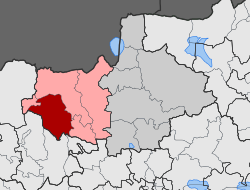Goumenissa
|
Goumenissa Γουμένισσα |
|
|---|---|

Central Square, The French Fountain
|
|
| Coordinates: 40°56′N 22°27′E / 40.933°N 22.450°ECoordinates: 40°56′N 22°27′E / 40.933°N 22.450°E | |
| Country | Greece |
| Administrative region | Central Macedonia |
| Regional unit | Kilkis |
| Municipality | Paionia |
| • Municipal unit | 208.9 km2 (80.7 sq mi) |
| Elevation | 268 m (879 ft) |
| Population (2011) | |
| • Municipal unit | 6,130 |
| • Municipal unit density | 29/km2 (76/sq mi) |
| Community | |
| • Population | 3,609 (2011) |
| Time zone | EET (UTC+2) |
| • Summer (DST) | EEST (UTC+3) |
| Postal code | 613 00 |
| Area code(s) | 2343 |
| Vehicle registration | ΚΙ |
| Website | www.goumenissa.eu |
Goumenissa (Greek: Γουμένισσα [ɣuˈme̞nisa]) is a small traditional town in the Kilkis regional unit, Central Macedonia, Greece. It was the capital of the former Paionia Province. Since the 2011 local government reform it is part of the municipality Paionia, of which it is a community and a municipal unit. The municipal unit has an area of 208.949 km2. The 2011 census recorded 3,609 residents in the community and 6,130 residents in the municipal unit. The town sits on the southeastern part of the Paiko mountain range. Located 69 km northwest of Thessaloniki, 539 km north of Athens and 20 km north of Pella, the ancient capital of the kingdom of Macedon. Goumenissa is the seat of the Greek Orthodox diocese of Goumenissa, Axioupoli and Polykastro.
Goumenissa has narrow streets lined with traditional houses and is renowned for a wide range of things; apart from its preindustrial monuments built beside lush springs, there are traditional wineries which prove the expertise of this small country town to produce good quality wine. It is known for its folklore museum, its impromptu brass bands (Τα Χάλκινα της Γουμένισσας Ta Chalkina tis Goumenissas) and its customs, events and fetes, all of them are reflective of the traditional lifestyle.
There are a lot of versions of the origin of the name Goumenissa. According to the local tradition, robbers hung the Abbot (Greek: Ηγούμενος egoumenos) of the abbey, and the city's name, which means place of Abbot derived from this In Bulgarian, it was called Гуменидже Gumenidzhe.
The town is located in part of the ancient Paeonia, the exact boundaries of which, like the early history of its inhabitants, are very obscure. According to Herodotus (v. 16), they were Teucrian colonists from Troy. Homer (Iliad, book II, line 848) speaks of Paeonians from the Axios River fighting on the side of the Trojans, but the Iliad does not mention whether the Paeonians were kin to the Trojans. Homer gives the Paionian leader as a certain Pyraechmes; later on in the Iliad a second leader is mentioned, Asteropaeus son of Pelagon.
...
Wikipedia


